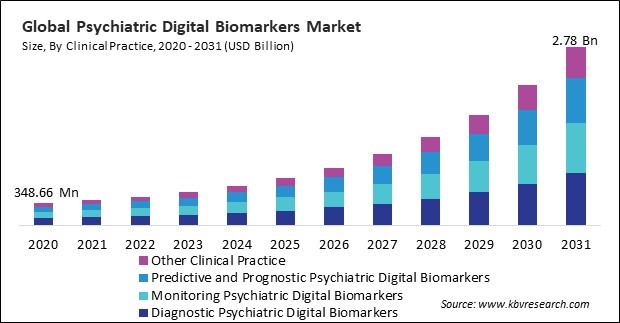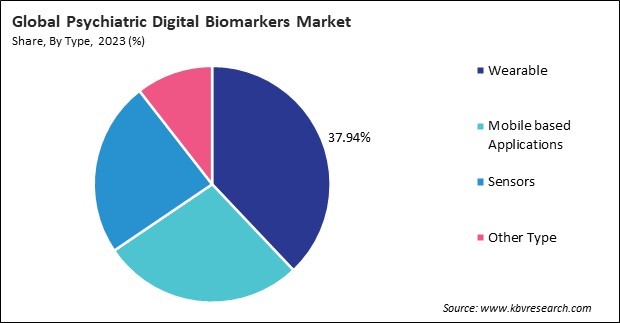“Global Psychiatric Digital Biomarkers Market to reach a market value of 2.78 Billion by 2031 growing at a CAGR of 24.1%”
The Global Psychiatric Digital Biomarkers Market size is expected to reach $2.78 billion by 2031, rising at a market growth of 24.1% CAGR during the forecast period.
Europe's increasing awareness of the importance of real-time monitoring and predictive analytics in mental health further drives the market’s growth in the region. Therefore, the Europe segment acquired 23% revenue share in the market in 2023. Favorable regulatory environments and public-private partnerships have supported the adoption of digital biomarkers across the region. Countries like Germany, the UK, and France are key contributors, with their investments in AI-driven healthcare and emphasis on personalized mental health care.

Integrating psychiatric digital biomarkers with artificial intelligence (AI) and machine learning (ML) technologies has amplified their potential. These technologies analyze immense quantities of patient data to predict outcomes and identify patterns, thereby assisting clinicians in the development of more precise diagnoses and the optimization of treatment plans. Thus, the shift toward personalized medicine, powered by psychiatric digital biomarkers, not only empowers clinicians but also fosters patient trust and engagement as individuals receive care that is precisely aligned with their unique mental health needs. Additionally, In the private sector, startups and established firms drive innovation in mental health technology. The surge in investment also supports research and development, particularly in integrating digital biomarkers into clinical trials. Pharmaceutical companies like Novartis and Pfizer are collaborating with tech firms to utilize wearable and app-based biomarkers for real-time assessment of psychiatric drug efficacy. Therefore, these factors will drive the growth of the market.
However, the reliance on cutting-edge technologies like artificial intelligence (AI), machine learning, and mobile devices in psychiatric digital biomarkers creates significant accessibility challenges. While these technologies can potentially revolutionize mental health care, they also unintentionally exclude populations with limited technological access or low digital literacy. Rural or economically disadvantaged areas, for example, often lack the infrastructure to support these advanced tools, such as reliable internet connectivity or modern smartphones. Hence, these factors may hamper the growth of the market.
By end-users, the market is divided into integrated device manufacturers (IDMs), semiconductor fabless companies, semiconductor test equipment manufacturers, and semiconductor outsourced assembly & test houses (OSATs). The semiconductor fabless companies segment garnered 26% revenue share in the market in 2023. Semiconductor fabless companies are driven by the need to ensure design efficiency and manufacturability, which are critical to maintaining their competitive position in the market.
Based on type, the market is classified into wearable, mobile based applications, sensors, and others. The wearable segment garnered 38% revenue share in the market in 2023. The wearable segment is propelled by its capacity to continuously monitor physiological and behavioral parameters, including physical activity, sleep patterns, and pulse rate, which are critical for the evaluation of mental health conditions. The convenience and integration of wearable devices with sophisticated analytics platforms, such as fitness trackers and smartwatches, have made them a popular choice among patients and healthcare providers.

On the basis of clinical practice, the market is divided into diagnostic psychiatric digital biomarkers, monitoring psychiatric digital biomarkers, predictive & prognostic psychiatric digital biomarkers, and others. The monitoring psychiatric digital biomarkers segment recorded 27% revenue share in the market in 2023. The growing emphasis on continuous mental health management and personalized care propels this segment. These biomarkers enable real-time tracking of a patient’s mental state, providing valuable data for assessing treatment efficacy and disease progression. The accessibility of monitoring solutions has been expanded by the rising usage of telehealth services and the integration of mobile applications.
By end use, the market is segmented into healthcare companies, healthcare providers, payers, and others. The healthcare companies segment witnessed 48% revenue share in the market in 2023. These companies make substantial investments in research and development, utilizing sophisticated technologies such as AI, machine learning, and big data analytics to develop state-of-the-art mental health diagnostics and management solutions. Strategic partnerships with technology firms, academic institutions, and healthcare providers further enhance their ability to develop robust, scalable, and clinically validated products.
Free Valuable Insights: Global Psychiatric Digital Biomarkers Market size to reach USD 2.78 Billion by 2031
Region-wise, the market is analyzed across North America, Europe, Asia Pacific, and LAMEA. The North America segment procured 53% revenue share in the market in 2023. The region’s high adoption of innovative tools like wearables and mobile applications is bolstered by increasing awareness of mental health issues and strong policy support. Government initiatives promoting digital health, alongside robust funding for mental health research, have further accelerated the growth of psychiatric digital biomarkers in North America. The region's capacity to dominate the market is also improved by the integration of AI and machine learning into healthcare systems.
| Report Attribute | Details |
|---|---|
| Market size value in 2023 | USD 517.47 Million |
| Market size forecast in 2031 | USD 2.78 Billion |
| Base Year | 2023 |
| Historical Period | 2020 to 2022 |
| Forecast Period | 2024 to 2031 |
| Revenue Growth Rate | CAGR of 24.1% from 2024 to 2031 |
| Number of Pages | 231 |
| Tables | 379 |
| Report coverage | Market Trends, Revenue Estimation and Forecast, Segmentation Analysis, Regional and Country Breakdown, Porter’s 5 Forces Analysis, Company Profiling, Companies Strategic Developments, SWOT Analysis, Winning Imperatives |
| Segments covered | Type, Clinical Practice, End Use, Region |
| Country scope |
|
| Companies Included | Canary Speech, Inc, Sonde Health, Inc. (Puretech Health Plc), Koneksa Health Inc., Empatica Inc., VivoSense, Inc., IXICO Plc, Neurotrack Technologies, Inc., Winterlight Labs, Aural Analytics, Inc. (Linus Health) |
By Type
By Clinical Practice
By End Use
By Geography
This Market size is expected to reach $2.78 billion by 2031.
Prevalence of Mental Health Disorders are driving the Market in coming years, however, Data Privacy and Technological Concerns restraints the growth of the Market.
Canary Speech, Inc, Sonde Health, Inc. (Puretech Health Plc), Koneksa Health Inc., Empatica Inc., VivoSense, Inc., IXICO Plc, Neurotrack Technologies, Inc., Winterlight Labs, Aural Analytics, Inc. (Linus Health)
The expected CAGR of this Market is 24.1% from 2023 to 2031.
The Diagnostic Psychiatric Digital Biomarkers segment is leading the Market by Clinical Practice in 2023; thereby, achieving a market value of $822.9 million by 2031.
The North America region dominated the Market by Region in 2023; thereby, achieving a market value of $1.41 billion by 2031.
Our team of dedicated experts can provide you with attractive expansion opportunities for your business.

 Drivers
Drivers
 Restraints
Restraints
 Opportunities
Opportunities
 Challenges
Challenges
